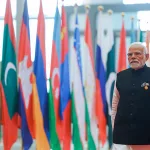The changing geo-political landscape is changing fast in India’s neighbourhood. There has been continuous transformation of India’s neighbourhood right from the time of India’s partition and independence. The Rising Kashmir has been underlining that the partition of India was a well-planned imperialist project meant to contain the rise of the independent India in South Asia. The British who had colonised India were aware of the emerging international landscape and its impact on global geo-politics. The exit of the British from India was the outcome of both internal freedom movement and the external economic constraints that were having tremendous bearing on the British governance in its colonies. But it goes to the credit of the Indian patriots who well understood the dilemma of the colonisers and thus, injected momentum into the freedom movement pressurising the British to speed up the exit from India. The British were shrewd in their handling of the exit from India. They did leave India but at a cost. They created a foothold in the Indian sub-continent with the creation of Pakistan on the communal lines. The British had earlier tried to vivisect India by using the Cabinet Mission Plan. It was a way to compensate the Muslim League for its politics of disruption to break the unity of India but the India patriots were astute enough to reject it, forcing Jinnah to the margins and later satisfy his ego with the “moth eaten” Pakistan that he himself has acknowledged. But one thing is clear that the British engineered the partition of India with the Muslim League on the driver’s seat. It was a severe blow to the unity of India. The basis on which the freedom struggle was being spearheaded. It encouraged the disruptive forces to dream of more Pakistan’s within the body politic of India to further weaken the national unity. Pakistan was created on the Eastern and Western fronts of India. It was a well-planned ploy to retard the Indian rise. But the religious basis could not hold together the Eastern and Western flanks of Pakistan. In 1971 Eastern part of Pakistan seceded from Western part as the discrimination and genocide of the Bengali Muslims and Hindus catalysed the partition of Pakistan. The result was the creation of Bangladesh as a new nation. India gave solace to the people subjected to genocide by those who claimed brotherhood on the basis of religion. But religion failed to keep East and West Pakistan united as one nation. The language and culture became the barrier as Bengalis were subjected to genocidal attrition by the Punjabi politico-military elite of West Pakistan. But over the decades Bangladesh that was having friendly relations with India has drifted away and adopted the political culture of Pakistan and has assumed its role as East Pakistan again and it is no longer Bangladesh as it has given up the democracy and the rule of law. It was overtaken by religious radicals who overthrew the democratically elected Sheikh Hasina and subjected the religious minorities to worst genocide and adopted the policy of animosity towards India. The close collaboration with the Pakistan Army and the radical religious agenda directed against India has become its cardinal policy under the caretaker government led by Mohammad Yunus. His policy has been brazenly anti-India. Not only that, the Chinese presence in terms of policy formulations in Bangladesh can be easily seen being implemented. One thing is clear that India is facing the onslaught of China, Pakistan and Bangladesh nexus to hinder the Indian rise in South Asia. Escalation by Pakistan after its terrorist bases were smashed by India is testimony to its neighbourhood policy and Chinese support of the Pakistani plank makes it incumbent upon India to take a holistic look of the neighbourhood calculus on the Eastern and Western front to devise a National Security Doctrine that will checkmate this vicious nexus to safeguard the territorial integrity and sovereignty of India.
Pakistan, China and Bangladesh Nexus

Sign Up For Daily Newsletter
Be keep up! Get the latest breaking news delivered straight to your inbox.
By signing up, you agree to our Terms of Use and acknowledge the data practices in our Privacy Policy. You may unsubscribe at any time.
Leave a Comment Leave a Comment
Stay Connected
Latest News
Recent Posts
- PM Modi’s successful visit to China is a testimony to his diplomatic skills,” says Rajnath Singh
- Authorities order closure of Dental Clinic in Bandipora
- J&K Police carries out wild bhang destruction drive in Anantnag
- Cannot show multi coloured dreams of new generation on old black white screen: PM Modi at SCO summit
- “It has been a one-sided disaster… they have now offered to cut their tariffs to nothing”: Trump on US-India business ties







